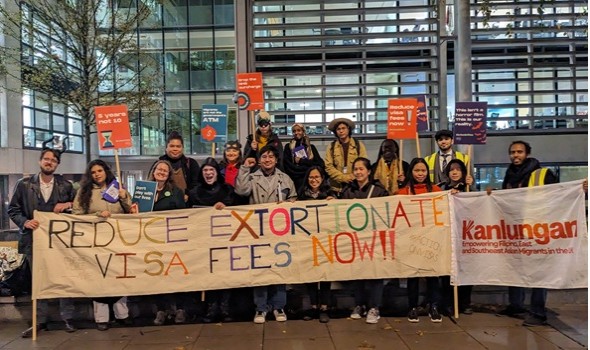The excessive price of being a migrant
The excessive price of being a migrant

Since moving to the UK in 2016 I’ve spent tens of thousands. of pounds in visa fees. That excludes my university fees and living expenses, which may run into six figures. This is a consequence of a choice I and my parents made to better myself and seize opportunities I could get only here.
I had been attending a British school, so the move made sense. But I started to be aware of the expense of being an international student. I didn’t have access to student finance or a student loan and scholarships were rare. Everything was paid by my parents, and visa restrictions meant I could not really work. But I had never contemplated spending a life in the UK after graduation, and had no reason to stay in the UK.
At the end of 2019, I met the love of my life and everything changed. My now husband, a Lithuanian who had lived in the UK for 10 years, made me envision a life here. My love for him grew along with my love for this country. I had no idea of the challenges that would face me in the quest to live with the one I love.
It’s 2020 and the Covid-19 pandemic is in full swing. I was nearing the end of my law degree and had plans of doing a master’s, potentially qualifying as a solicitor and securing another couple of years in the UK on my Tier 4 student visa.
But the costs of extending my stay here were becoming out of reach. Anxiety over my looming visa expiry made me queasy. I couldn’t ask my parents, who had already sunk their life savings into my education; I couldn’t ask my boyfriend, who wasn’t yet financially in a position to help. It became clear that I would need to give up my place at law school, along with continued life in the UK.
I couldn’t stay. I couldn’t go.
I succeeded in obtaining a two-month visa extension because, as a result of my parents’ own movements at the time, I had essentially nowhere to go. When eventually I was able to leave, I had to leave most of my belongings and along with them, my life.
I eventually made it back to the UK via the fiancé/partner/spouse route — with delays, interrogation and expense. I thought I had rid myself of the shackles of a hostile system. I could move on with my life and start to build my future.
However, in December 2023 the government declared that the Minimum Income Requirement (MIR) was due to increase from £18,500 to £38,700.
My life in the UK was again under threat. I cried, I screamed, I spiralled. I felt foolish, for letting myself believe that I could be allowed stability and a home here. I started frantically mentally preparing myself for the evitable, while my husband kept reassuring me that it would all work out.
In a bitter-sweet turn of events, things did work out. My spouse visa renewal was recently approved for an additional 2.5 years when I hope I will be able to secure Indefinite Leave to Remain (ILR), which would provide an increased sense of stability.
However, I spent over £4,000, plus £200 for an appointment in London to complete my biometrics — essentially, the most expensive 10 minutes of my life. About £2,500 of the cost was the NHS surcharge payment that allows migrants access to the NHS, a service my 9 to 5 job already taxes me for.
Visa renewal took a huge chunk out of mine and my husband’s savings. Working hard, saving every penny, in hope of using it towards our future and instead having to use it to solidify my stay in a country that on occasion has expressed disdain for my presence, is painful. I have fondness towards this country and even dare call it home, but it has taken from me. I have sacrificed a lot to be allowed to live here, not just physically but financially.
Migrants are tired, exhausted. Yet visa fees, along with MIR, show no signs of being reduced. The pressures of trying to uphold the ‘model migrant’ persona while policies continue to withhold our humanity and keep us much further from having fruitful lives in the UK; needing to explain over and over to people the process we go through to simply have the pleasure of being here. No migrant deserves to have their life in the UK made inaccessible because it’s been decided that thousands of pounds is a justifiable cost to having a home here.
Photo credit: Migrant Voice


